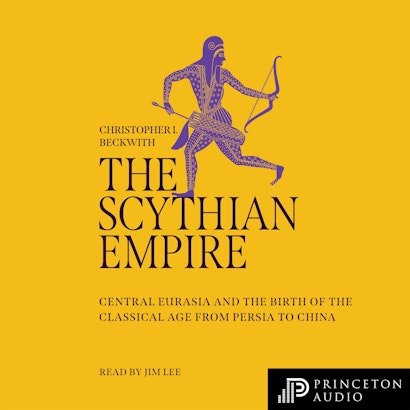In the late 8th and early 7th centuries BCE, Scythian warriors conquered and unified most of the vast Eurasian continent, creating an innovative empire that would give birth to the age of philosophy and the Classical age across the ancient world—in the West, the Near East, India, and China. Mobile horse herders who lived with their cats in wheeled felt tents, the Scythians made stunning contributions to world civilization—from capital cities and strikingly elegant dress to political organization and the world-changing ideas of Buddha, Zoroaster, and Laotzu—Scythians all. In The Scythian Empire, Christopher I. Beckwith presents a major new history of a fascinating but often forgotten empire that changed the course of history.
At its height, the Scythian Empire stretched west from Mongolia and ancient northeast China to northwest Iran and the Danube River, and in Central Asia reached as far south as the Arabian Sea. The Scythians also ruled Media and Chao, crucial frontier states of ancient Iran and China. By ruling over and marrying the local peoples, the Scythians created new cultures that were creole Scythian in their speech, dress, weaponry, and feudal socio-political structure. As they spread their language, ideas, and culture across the ancient world, the Scythians laid the foundations for the very first Persian, Indian, and Chinese empires.
Filled with fresh discoveries, The Scythian Empire presents a remarkable new vision of a little-known but incredibly important empire and its peoples.
Awards and Recognition
- A New Yorker Best Book We've Read This Year
- A History Today Book of the Year
Christopher I. Beckwith is Distinguished Professor of Central Eurasian Studies at Indiana University. His many books include The Tibetan Empire in Central Asia, Greek Buddha, and Warriors of the Cloisters (all Princeton). Jim Lee is a continuity announcer and newsreader on BBC Radio 4, BBC World Service, and Radio 4 Extra. He is the narrator of Christopher I. Beckwith’s Empires of the Silk Road (Princeton).
“A revolutionary rewriting of the current dominant view on Ancient Central Eurasia, The Scythian Empire will deeply transform what we believed the Greek, Roman, Persian, and Chinese classical ages were. Christopher I. Beckwith, one of the world’s leading linguists, has made accessible the story of the earliest known steppe empire in what is not only a provocative rethinking of Scythian history but a fascinating exploration of their language, art, and philosophy. Interpretatively audacious, adventurous, and ambitious, The Scythian Empire will generate debates for years and make readers see the history of Eurasia in an entirely unexpected way.”—Marie Favereau, author of The Horde: How the Mongols Changed the World
“Long forgotten, misunderstood, and dismissed as barbarians, the Empire of Scythia emerges at last from the shadows of ancient history, thanks to Christopher I. Beckwith. His insightful revelations illuminate the far-reaching legacies of the nomads who roamed and ruled the vast territory from the Black Sea to China’s Great Wall. This is a fascinating story of how Scythian culture and innovations in horsemanship, archery, linguistics, technology, warfare, practical dress, and ideas not only spread across the Eurasian continent but powerfully shaped the earlier empires of Persia, India, and China.”—Adrienne Mayor, author of The Amazons: Lives and Legends of Warrior Women across the Ancient World
“Using a wide array of sources, Beckwith has produced an original, pathbreaking, and provocative book that underscores the importance of the Scythians of ancient Central Eurasia in the shaping of peoples, political structures, ideologies, and classical civilization in the eastern Mediterranean world, Greater Iran, China, and South Asia.”—Peter Golden, author of Central Asia in World History
“The first millennium BCE was a pivotal age, producing a remarkable number of key military, political, religious, and technological innovations. In The Scythian Empire, the renowned scholar Christopher I. Beckwith overturns the received wisdom that Inner Eurasia was a ‘Barbarian periphery’ impacted by these developments but rarely their agents. He cogently argues that the Scythians not only developed such ideas as monotheism and fitted clothing but also built the first megaempire. Highly recommended reading.”—Peter Turchin, author of Ultrasociety: How 10,000 Years of War Made Humans the Greatest Cooperators on Earth

